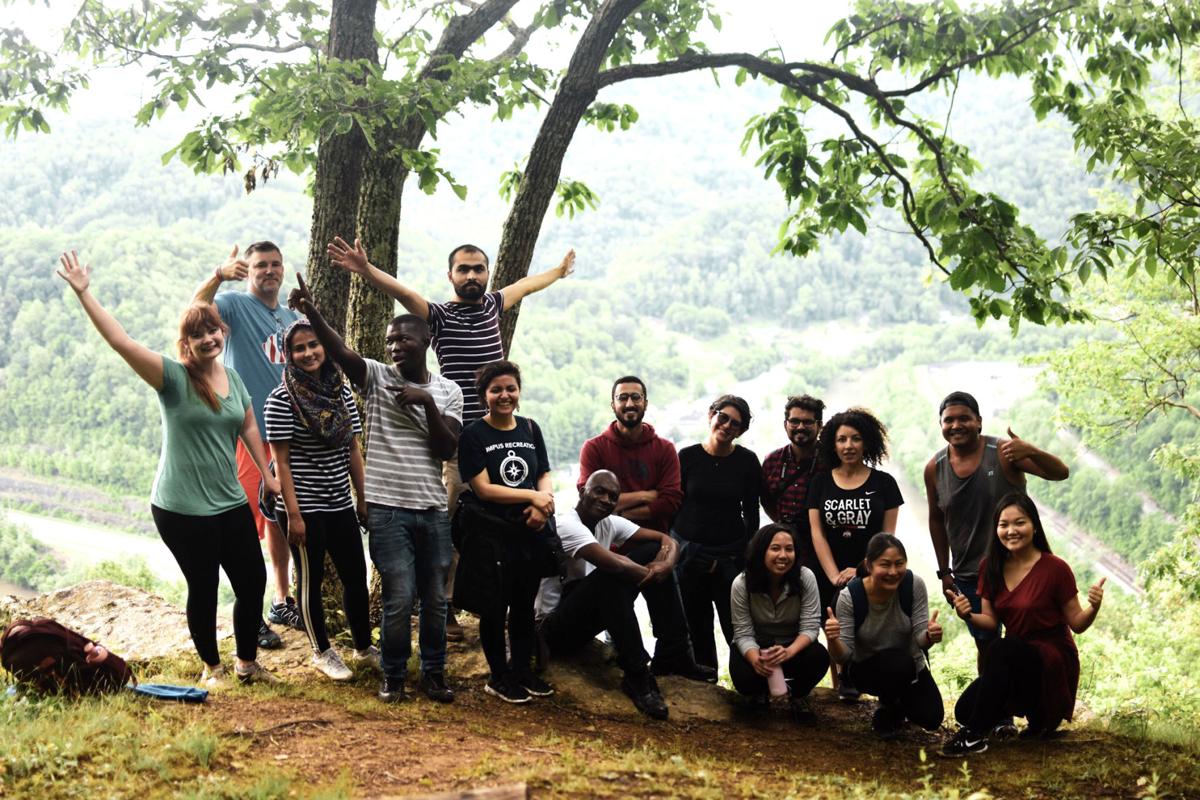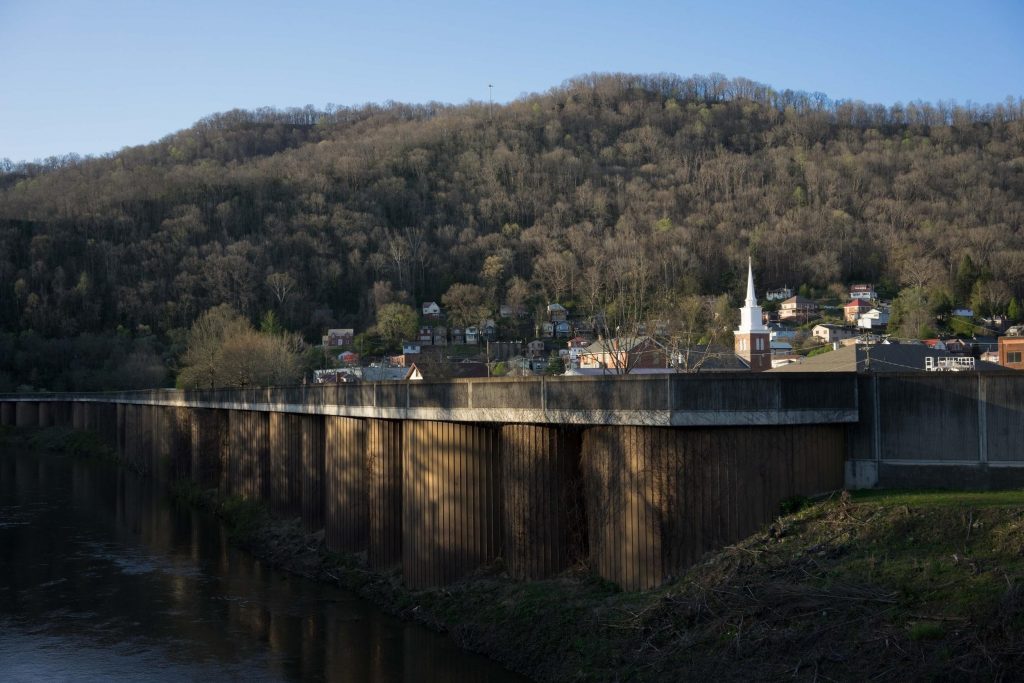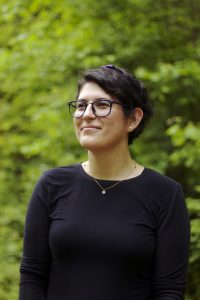 By Jenny Melo, Fulbright Foreign Student from Colombia
By Jenny Melo, Fulbright Foreign Student from Colombia
With a learning and service journey to Williamson, West Virginia, I finished my first year as a grad student studying rural sociology & sustainability. I joined a group of 11 international Fulbrighters interested in first-hand community service experience to see how this rural Appalachian community has developed and changed throughout the years.
When I applied to the Fulbright Amizade program, my knowledge of Williamson was limited to information in the news. If you do a quick search, you will find mostly unflattering stories on the opioid and coal mining crises. There are fragments of reality in that, but I knew that was an incomplete story. I am Colombian, and I know from personal experience how the media can disseminate harmful stereotypes and create distorted and incomplete representations of particular communities, and even whole countries. Understanding communities is not monochromatic; it requires a complex and nuanced perspective. My experience in Williamson confirmed that for me, and I am grateful for it.
We spent a full week together in the town, visiting and volunteering at different health, well-being, farming, and education initiatives, and learning of community organizers’ unique perspectives on Williamson. I also spent an afternoon with a mother of three, talking about how the deterioration of the coal mining industry has negatively impacted her family. These conversations expanded my understanding of what systemic community interventions look like, and reinforced my belief in going beyond stereotypes and one-dimensional views in order to develop a multidimensional approach that includes political, economic, environmental and social dynamics.
One of the initiatives that impacted me the most was the Williamson Health and Wellness Center (WHWC), a project led by Dr. Christopher D. “Dino” Beckett. This initiative uses a holistic approach to community development and is a collective response to the crises that Williamson’s citizens face, including the downturn of the coal mining industry, unemployment, and the opioid crisis. Far from a simplistic approach focusing only on access to health care, the WHWC utilizes multidimensional practices, such as access to healthy food, parks and recreational activities, safe community spaces, education, transportation, housing, and economic diversification. With these resources, everyone has an opportunity available for them. The WHWC understands that a 360-degree problem requires a 360-degree solution.
The WHWC and Williamson face several challenges created from national and international dynamics. However, the community is doing its part to thrive despite difficulties, and is reclaiming the right to tell their own story. Williamson Forward is a local news initiative fighting against stereotypes by sharing other, positive sides of community life.
This journey was a genuinely compelling experience for me, a grad student working in rural areas, who believes in the need for community resistance and collective action. I hope to come back to this Appalachian beauty someday.
By Oyundari Ganbaatar, Foreign Fulbright Student, Mongolia
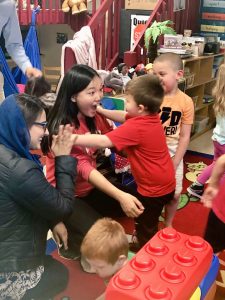
Oyundari visits a PK-8 School in Williamson, WV.
When I first received the email inviting me to attend the weeklong Fulbright-Amizade service-learning program in Williamson, West Virginia, I was excited to share the great news with my family and friends. However, their reactions were indifferent. My family in Mongolia had never heard of Williamson, and my friends in the U.S. told me that there is nothing to see or do in that part of the country. But I wasn’t discouraged. Instead, I was even more curious to learn about this unfamiliar town.
On May 11, 2019, I traveled from Houston to Charleston, West Virginia, where I met with other Fulbright-Amizade participants from 11 different countries. From there, we drove to Williamson. Our hour and a half-long drive to Williamson was filled with picturesque mountains and vibrant green forest.
During our first few days in Williamson, we learned about the town by visiting different sites, engaging in service activities and meeting with community members. One week is not enough time to learn everything about the town, but it was long enough to break the negative stereotypes we had heard before the trip. It is true that Williamson struggles with many hardships, including the opioid crisis, chronic diseases, unemployment, and depopulation. But are these not global issues that almost every city and country in the world also deal with?
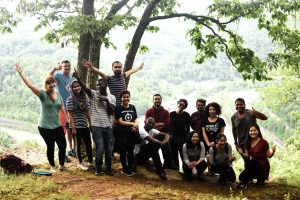
The Fulbright-Amizade group on top of Death Rock Mountain.
We experienced many positive moments while in Williamson. We saw a community that has identified their problems and is doing everything they can to change things for the better. Despite the struggles caused by the decline of the coal industry and several devastating floods, Williamson is a town that works hard to solve their problems together as a community. They’ve implemented programs such as the Health and Wellness Center to provide affordable health and dental care for residents, a recovery center to deal with the county’s drug problem, sustainable tourism to attract new visitors, active living programs that encourage community members to adopt a healthier lifestyle, and in-home parenting education programs to make sure no family is left behind.
This experience was eye-opening. Through Fulbright-Amizade, I now understand the importance of working together to overcome difficulties. I witnessed the hard work and perseverance of the Williamson community. I learned about concepts that I can apply to my community when I return to Mongolia. Moreover, I believe we also impacted those we met in Williamson by not only sharing and introducing our cultures and stories, but also helping them to tell their stories to us. Ultimately, the trip was about the importance of mutual understanding and mutual benefit. I hope the community will continue its optimism and hard work towards positive change and sustainable development. I would be delighted to visit Williamson again in the future to see their progress and achievements in the years to come.
Oyundari is pursuing a master’s in public policy at the University of Houston.
2018 Fulbright Amizade Participants Interview West Virginia Community Leaders
September 20, 2018
Fulbright Amizade Participants Travel to Appalachia for Service Learning
May 2, 2018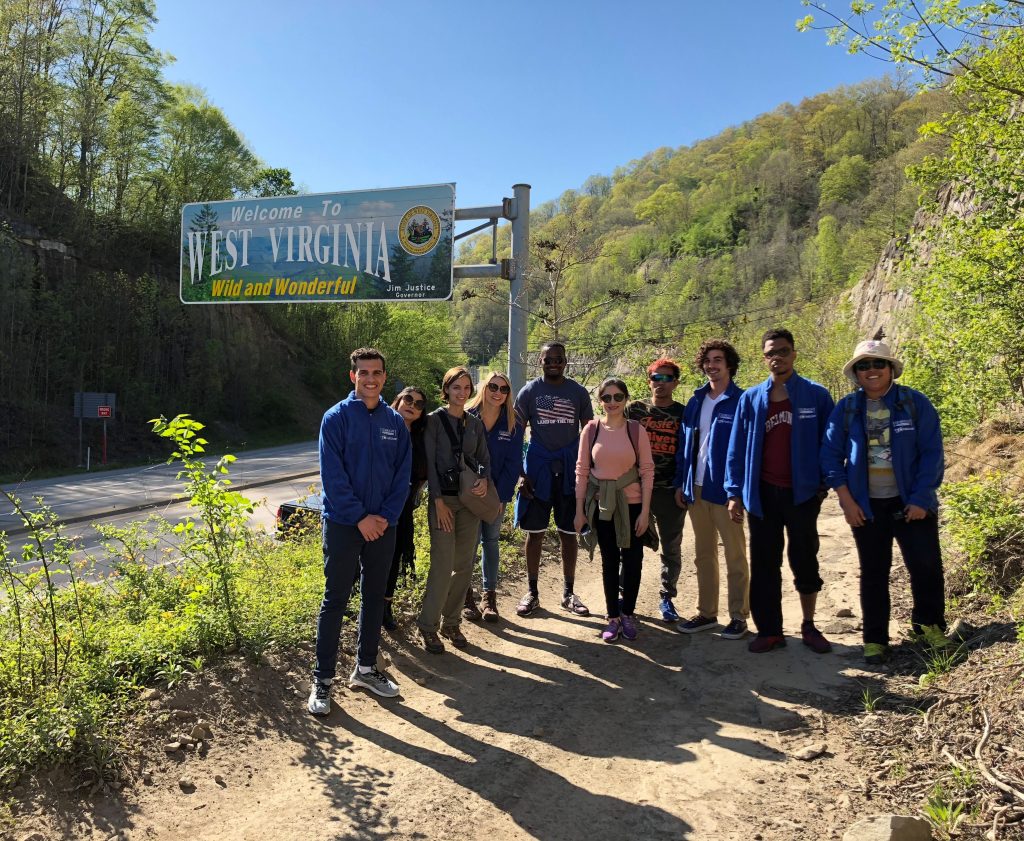
The Fulbright Foreign Students participating in the 2018 Amizade service-learning seminar representing ten countries.
From April 28 – May 5, 2018, the U.S. Department of State’s Bureau of Educational and Cultural Affairs sponsored ten Fulbright Foreign Student Program participants to engage in a week-long service-learning program in Williamson, West Virginia led by Amizade Global Service-Learning. The selected Fulbrighters, emerging leaders in a variety of fields, have all demonstrated a commitment to service in their communities. This is the third year that Amizade and Fulbright will work together in West Virginia.
This activity will support the Fulbright Program’s overall mission of increasing mutual understanding between the people of the United States and the people of other countries by forging meaningful connections between these Fulbrighters and an American community with valuable lessons to share. The focus on service learning highlights the importance of volunteerism in the United States and how local communities in Appalachia are pioneering and engaging in thoughtful work to maintain their cultural framework while also creating a realm of new opportunities.
During their week-long program in Williamson, the group of ten Fulbrighters will participate in community service activities and learn about the town and its history. Williamson is a small, rural coal-mining town in Mingo County that was once home to 10,000 residents and a thriving coal economy in the mid-20th century. However, in recent years, Williamson has experienced a collapsed coal mining industry, a series of devastating floods, and de-population.
Editor’s note: In April 2017, twelve Fulbrighters engaged in a week-long service learning project in Williamson, West Virginia, an Appalachian community with valuable lessons to share about sustainability, perseverance and revitalization. This is one in a series of blog posts from the Fulbrighters who visited Williamson. This post by Fulbright Foreign Student from Colombia, Jorge Caraballo, who accompanied the group as a photojournalist, captures the Fulbrighters’ experiences in Williamson, as well as their engagement with local American community leaders. Visit the Fulbright Amizade 2017 Storify for more details on their journey.
Last year I had to interrupt my first visit to Williamson because of a family emergency. I remember flying over the Appalachians on my way back to Boston feeling a soft window-seat nostalgia: This small city in southern West Virginia reminded me a lot of Colombia, my home country. I also grew up surrounded by mountains and immersed in a culture with a strong sense of belonging. Three days were enough for me to create a strong connection with Williamson and its people.


